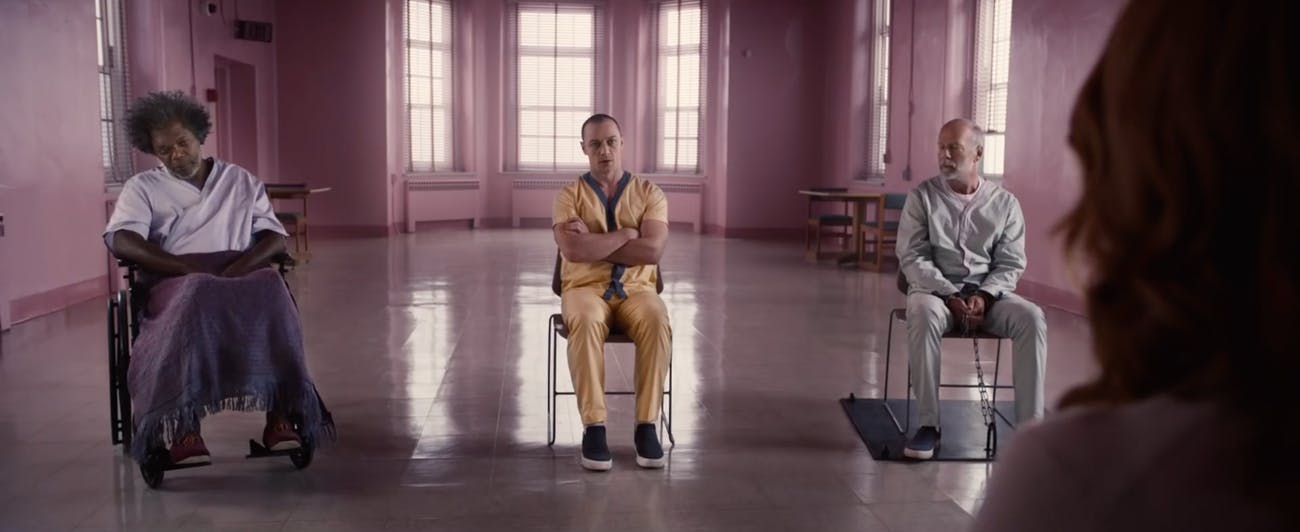Glass - Review

Nineteen years after Unbreakable, writer-director M. Night Shyamalan is back with Glass, the conclusion to a trilogy that also includes surprise 2016 hit Split. As the name suggests, the third and final installment in this series pivots around Samuel L. Jackson's Elijah Price, a brilliant but brittle mastermind also known as Mr. Glass. Award-winning actress Sarah Paulson also enters the fray in this edition, as Dr. Ellie Staple - a psychiatrist tasked with resolving our three protagonists 'delusions of grandeur' regarding their supernatural powers.
Despite the film's ostensible focus on Mr. Glass, this movie really serves as a showcase to the incredible talents of James McAvoy, much like Split before it. His ability to give 23 separate characters in one body believeable and distinct personalities is a Herculean task he pulls off with aplomb. Some of the more prominent personalties even get something resembling a legitimate character arc, with knowledge gained and questions asked that remain separate from the others. The abrupt switches also provide some much needed moments of levity to a movie that otherwise takes itself incredibly seriously. It feels totally earned that, in the end credits, he's given an individual line for each of the many personalities inside Kevin's head. He won't recieve awards consideration for this performance, but he should.
Unfortunately, the same can't quite be said for the rest of the movie. It doesn't match the moment-by-moment tension of Split, and in essence much of it is a rerun of the same questions integral to Unbreakable, just executed worse. Bruce Willis' David Dunn goes through many of the exact same beats as he does in the original, at first doubting and then exploring his power. Unbreakable was already an origin story, yet Glass is functionally attempting to be one as well, with various characters from Split getting thrown in for good measure.
In essence, the issue is that Glass feels like both a Split sequel and an Unbreakable sequel, rather than a true summation of a connected trilogy. That shouldn't really be surprising, given that Split wasn't actually a superhero movie until the very end, and that Unbreakable premiered in 2000 to a completely different cinematic environment. A pre-Marvel, pre-Christopher Nolan Batman environment. The original X-Men had only premiered a few months earlier. What it means to be a superhero film and what audiences expect out of a superhero film has changed radically in that time.
None of this is to say that it's a bad movie. It isn't. In addition to the aforementioned McAvoy, the rest of the performances are terrific. Anya Taylor-Joy also returns from Split, and she is poised to become one of our finest young actresses. Samuel L. is Samuel L., and Bruce Willis even actually puts in some effort! Spencer Treat Clark, who played Willis' young son in Unbreakable all those years ago, admirably returns to the same role as an adult, a rarity. The fight sequences are particularly captivating, and M. Night gives his many stylistic dialogue and camera flourishes that for better or worse, separate his films from the rest of Hollywood. We always salute originality around here.
Of course, in classic Shyamalan fashion, there are ending twists that can't really be gotten into here without spoiling anything. There's also the requisite cameo from Shyamalan himself. At least he didnt make himself one of the main characters like in Lady in the Water. Baby steps!
Final rating: 7/10
Stay tuned to WhoReps as we continue to review movies all year long.
 WhoRepresents.com is safe & secure
WhoRepresents.com is safe & secure